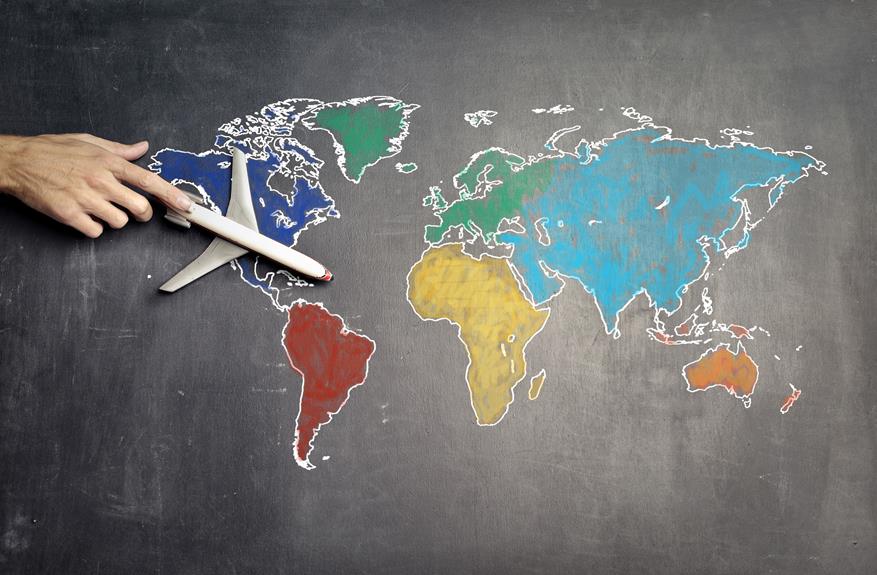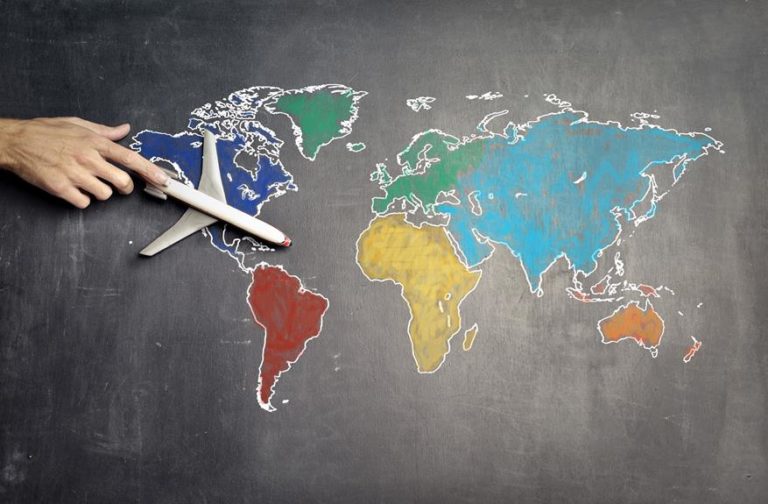Global Guide: Navigating Visa Rules for Digital Nomads
Imagine a world where you roam freely, working remotely from anywhere your heart desires. But wait, visa rules are here to dampen your digital nomad dreams. Fear not! Our global guide is here to help you navigate the labyrinth of visa regulations. Whether you're eyeing Europe, North America, South America, Asia, Oceania, Africa, or other destinations, we've got you covered. Get ready to break free from the chains of bureaucracy and explore the world as an independent, creative, and remote wanderer.
Key Takeaways
- Different countries in Europe and North America have varying visa regulations and requirements for digital nomads.
- It is important to research and understand the specific visa requirements for each country in order to plan and apply for the appropriate visa based on your travel plans.
- Work permits may be necessary for digital nomads in North America, and remote work permits are popular options.
- Overstaying a visa can have serious consequences, such as fines or deportation, so it is important to adhere to the visa duration limits and follow the legal requirements of each country.
Europe Visa Regulations
When planning your digital nomad journey, it's essential to familiarize yourself with the visa regulations in Europe. Europe offers a variety of visa types for digital nomads, each with its own set of requirements. One of the most common visas is the Schengen visa, which allows you to travel freely within the Schengen Area for up to 90 days within a 180-day period. However, if you plan to stay longer or travel to countries outside the Schengen Area, you may need to apply for a different type of visa. It's important to research and understand the specific visa requirements for each country you plan to visit in Europe. Now, let's dive into the visa requirements for digital nomads in North America.
North America Visa Requirements
Ready to explore the visa requirements for digital nomads in North America? Let's start with work permits. Depending on the country you plan to visit, you may need to apply for a work permit to legally work while on your digital nomad journey. Additionally, keep in mind that there are visa duration limits in North America, so it's crucial to understand the maximum amount of time you can stay in each country.
Work Permits for Nomads
To work legally as a digital nomad in North America, you will need to obtain a work permit. Thankfully, there are visa options available for remote workers like yourself. One of the most popular options is the remote work permit, which allows you to live and work in North America for a specific period of time. This permit is ideal for digital nomads who want to explore different countries in the region while continuing to work remotely. The process of obtaining a remote work permit may vary depending on the country you choose to work in, so it's important to do your research and understand the specific requirements. Overall, a remote work permit can provide you with the flexibility and freedom to pursue your nomadic lifestyle while still adhering to the legal requirements of working in North America.
Visa Duration Limits
To comply with North America visa requirements, you must be aware of the duration limits for your visa. Different countries in North America have varying rules and guidelines when it comes to visa durations. It is important to know these limits to avoid any penalties or issues during your stay. Here is a table summarizing the visa duration limits for some popular countries in North America:
| Country | Visa Duration Limit |
|---|---|
| United States | 90 days |
| Canada | 6 months |
| Mexico | 180 days |
It's worth noting that these durations generally refer to tourist visas. If you plan on staying longer or working remotely, you may need to go through a visa renewal process or apply for a different type of visa. Overstaying your visa can result in serious consequences, such as fines, deportation, or even being banned from reentering the country. Make sure to familiarize yourself with the specific visa regulations of the country you plan to visit to avoid any complications.
South America Visa Guidelines
Ready to embark on your digital nomad journey through South America? Before you start packing your bags, it's important to familiarize yourself with the visa requirements for each country and the visa application process. From Brazil to Argentina, Chile to Peru, each country has its own unique guidelines, so make sure to do your research and plan accordingly to ensure a smooth and hassle-free experience.
Visa Requirements by Country
If you are planning to travel to South America as a digital nomad, it's important to be aware of the visa requirements in each country. Luckily, there are some visa options available for remote workers. In South America, there are several countries that offer visa-free entry for digital nomads. For example, Argentina allows digital nomads to stay for up to 90 days without a visa. Chile also offers a 90-day visa-free entry for remote workers. Brazil allows digital nomads to stay for up to 180 days without a visa. Ecuador is another option, offering a 90-day visa-free entry for digital nomads. These visa-free countries provide great opportunities for digital nomads to explore South America while working remotely. Just make sure to check the specific requirements for each country before you travel.
Visa Application Process
When applying for a visa in South America, follow these guidelines to navigate the visa application process smoothly. First, make sure you have all the necessary documents, such as a valid passport, completed application form, and proof of financial stability. It is also essential to prepare for the visa interview by practicing common visa interview questions and having all the required supporting documents ready. To help you further, here are some visa interview tips:
- Dress professionally and arrive on time.
- Be confident and maintain eye contact.
- Answer questions honestly and concisely.
Avoid common visa application mistakes, such as submitting incomplete or inaccurate information, not following the specific visa requirements, or missing important deadlines. By following these guidelines, you can increase your chances of a successful visa application process.
Asia Visa Policies
To enter most Asian countries as a digital nomad, you will need to obtain a valid visa. Navigating the visa policies in Asia can be a bit complex, but with the right information, you can make the process smoother. Here are a few key things to know about Asia visa policies:
- Asia Visa Categories:
- Tourist Visa: Allows you to stay in the country for a limited period of time for tourism purposes.
- Business Visa: Required if you plan to engage in business activities or attend meetings or conferences.
- Work Visa: Necessary if you want to work in a specific country for an extended period.
- Visa Fees in Asia:
- Visa fees vary depending on the country and the type of visa you are applying for.
- It's important to check the official embassy websites for accurate and up-to-date fee information.
As you explore the visa policies in Asia, it's important to note that each country has its own specific requirements and regulations. Now, let's move on to the next section about Oceania visa restrictions, where we will delve into the visa policies of countries in the Pacific region.
Oceania Visa Restrictions
Navigating Oceania's visa restrictions as a digital nomad requires understanding the specific entry requirements for each country. To help you plan your travels, here is a breakdown of visa exemptions and visa application fees in Oceania:
| Country | Visa Exemptions | Visa Application Fees |
|---|---|---|
| Australia | Electronic Travel Authority (ETA) | AUD 20 |
| New Zealand | Visa Waiver Program | NZD 9 |
| Fiji | Visa-exempt for 4 months | FJD 238 |
| Vanuatu | Visa-exempt for 30 days | VUV 3,000 |
In Australia, you can apply for an Electronic Travel Authority (ETA) online for a fee of AUD 20. New Zealand offers a visa waiver program, allowing digital nomads to stay for up to 90 days without a visa, with a fee of NZD 9. Fiji welcomes digital nomads for up to 4 months without a visa, while Vanuatu allows a visa-exempt stay of 30 days for a fee of VUV 3,000. Make sure to check the latest visa requirements and fees before planning your digital nomad journey in Oceania.
Africa Visa Procedures
To continue exploring visa rules for digital nomads, let's delve into the visa procedures in Africa. When it comes to African visa eligibility, requirements vary from country to country. Some countries offer visa-free entry for certain nationalities, while others require visas for everyone. To navigate the African visa application process smoothly, keep these key points in mind:
- Research: Before embarking on your journey, research the visa requirements of your chosen African destination. Understand the duration of stay allowed and the necessary documents you need to provide.
- Application: Start the African visa application process well in advance to allow for any unexpected delays. Fill out the application form accurately and provide all the required supporting documents.
- Consulate Visit: Visit the nearest African consulate or embassy to submit your application and pay any necessary fees. Be prepared to answer any additional questions the consulate may have.
Other Destinations' Visa Rules
As you continue exploring visa rules for digital nomads in Africa, let's now shift our focus to the visa requirements for other destinations around the world. When it comes to digital nomad visa options, there are several countries that have recognized the growing trend and have implemented specific programs to cater to remote workers. For example, countries like Estonia, Barbados, and Georgia have introduced digital nomad visas that allow individuals to live and work remotely for an extended period of time. These visas provide flexibility and freedom to explore new cultures while maintaining a steady income. Additionally, there are also visa free travel opportunities available for digital nomads in certain countries. For instance, some countries in Southeast Asia, such as Thailand and Indonesia, offer visa exemptions or visa on arrival for short-term stays. These options make it easier for digital nomads to travel and work in different locations without the hassle of extensive visa procedures.
Frequently Asked Questions
Can Digital Nomads Apply for a Working Visa in Europe Without Having a Job Offer From a European Employer?
Yes, you can apply for a working visa in Europe as a digital nomad without a job offer from a European employer. It's important to research the specific visa options and requirements for remote work in South America.
Are There Any Specific Visa Programs in North America That Cater Specifically to Digital Nomads?
Are there specific visa programs in North America for digital nomads? Yes, there are. They offer flexibility and freedom, allowing you to work remotely while exploring new places. However, they may have certain limitations and requirements.
What Are the Visa Requirements for Digital Nomads Looking to Work Remotely in South America?
Looking to work remotely in South America? Visa requirements for digital nomads vary by country. Some countries offer special visa programs, while others may require a business visa. Consider the pros and cons before making your decision.
Are There Any Countries in Asia That Offer Long-Term Visas for Digital Nomads?
Looking to work remotely in Asia? Several countries offer long-term visas for digital nomads. Each has its pros and cons, so research before you go. Explore the vibrant cultures and stunning landscapes while working independently.
Are There Any Visa Restrictions for Digital Nomads in Oceania, Particularly in Popular Destinations Like Australia and New Zealand?
Hey there, wondering about visa restrictions for digital nomads in Oceania? Well, Australia and New Zealand are popular destinations, but COVID-19 has impacted visa regulations. It's important to stay updated with the latest rules.





